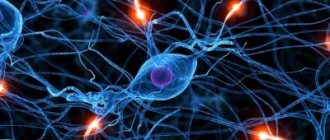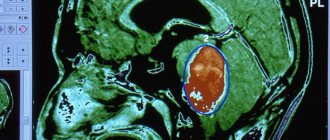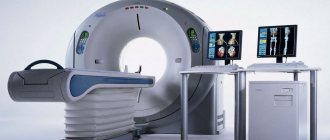Senile insanity - what is it?
Numerous factors can provoke the appearance. Before you begin the process of fighting the disease, you need to know the factors that affect your health:
- regular pressure changes;
- tumor formation;
- diabetes;
- heredity.
All of the above points have a strong effect on the blood. As a result, blood vessels narrow and the gray matter no longer functions normally.
The main reason for the appearance of pathology is based on vascular damage. This leads to atrophy of a specific area.
There is a widespread misconception in the world that aging always leads to changes in the psyche, a decrease in memory and thinking. However, senile dementia never occurs due to physiological aging of the body. It appears only against the background of diseases leading to damage to the central nervous system (CNS). At the same time, the ICD-10 code for senile dementia depends on the cause and can be designated by the code F00-F03.
There are two main groups of diseases responsible for the development of senile dementia. The first group includes diseases that lead to the destruction of the normal structure of the nervous system - neurodegenerative diseases. They appear for the first time at the age of 65-68 years and are the main cause of senile dementia.
The main role in the development of senile dementia against the background of neurodegenerative diseases is played by hereditary predisposition and genetic mutations. Recent research in neuroscience and molecular genetics has identified several genes responsible for damage to nerve tissue. Due to a genetic mutation, the normal synthesis of protein molecules is disrupted, and a specific protein, amyloid, begins to be deposited in the brain.
Accumulations of amyloid interfere with normal blood flow in the cerebral cortex, and nerve cells gradually die due to lack of oxygen and nutrients. In parallel with the death of nerve tissue, the synthesis of acetylcholine, a substance responsible for the rapid conduction of electrical impulses between neurons, decreases.
The second group of diseases is represented by diseases accompanied by disruption of normal blood circulation in the brain - ischemic and hemorrhagic stroke, arterial hypertension and frequent hypertensive crises, atherosclerotic plaques in the lumen of brain vessels.
Senile dementia due to diseases of the cardiovascular system is a consequence of disruption of normal blood flow in the brain. Due to the growth of atherosclerotic plaques in the lumen of the cerebral vessels, a gradual decrease in blood circulation occurs, then areas of ischemia (an area of reduced blood flow) of the nervous tissue develop.
This is the name of the final stage of mental failure. Elderly people with this illness are forced to overcome difficulties every day, they cannot help their children and grandchildren, and they themselves need care and supervision.
Advanced years complicate the detection of pathology. The most important symptom is a complete change in the usual way of life, a loss of self-image. This is a pathology to which people of senile age (after 60 years) are prone. Therefore, special attention is needed to grandfathers and grandmothers.
Severe dementia is characterized by loss of personality. The person himself changes, his ways of contact with the world around him change. Basic skills to solve everyday problems and take care of oneself are lost. An irreversible process leads to psychological changes. An elderly person sometimes becomes dangerous to his own people and to strangers.
Dementia does not manifest itself in a healthy individual, only as a consequence of an existing disease. Latent pathology can occur without symptoms, but after complications it develops very quickly. This is an acquired disorder. Causes deterioration:
- nervous system disorders;
- pathological old age;
- bad heredity.
In older people, the immune system is weakened. When pathology occurs, it is activated against cellular formations, leading to a weakening of brain functions. The cause of degradation may be weakening of brain tissue and atrophy of the cortex. Cells also disintegrate under the influence of infections and viruses.
Note that alcohol also destroys the connections of neural formations. As a result, degeneration of brain functions occurs.
Leave a request for selection of a boarding house
for an elderly person with senile dementia
Manifestations are difficult to correct without qualified help. If there are complications, the disease progresses quickly, and the chance of rehabilitation decreases with each stage.
The problem is clearly illustrated in the medical literature. Classic primary sign: exacerbation of negative character traits. These are hysteria, mood swings, gloominess, grumpiness, isolation. Life with an elderly person turns into a series of difficult challenges.
People with this disease bring home garbage and all kinds of rubbish. They do not throw anything away and prohibit others from doing so. Greed becomes inadequate. Egocentrism increases many times over. Similar personalities:
- do not worry about relatives;
- they forget the faces of children and grandchildren;
- indifferent to others;
- keep things that mean nothing.
It is very difficult to independently monitor such individuals. They require increased attention, control and patience:
- They stop taking care of themselves and forget about basic hygiene. If the senile person does not have relatives or friends, then they are found in houses where the rooms are filled with garbage and the smell is already bothering the neighbors.
- A sign of senile insanity in women is an unhealthy appetite. They forget about recent meals and may eat food uncontrollably.
- Even a previously developed person loses his will and personality under the influence of dementia. Instincts become more acute and become more important than socialization.
- If the frontal cortex is damaged, then the symptom is hypertrophied sexuality and cheeky behavior.
Elderly people with such mental disorders are not able to exist independently. Progression leads to complete loss of abilities. But if you contact the “Zabota” boarding house network, your loved ones will be provided with round-the-clock care and rehabilitation.
Temporary and permanent accommodation in comfortable rooms, supervision by specialists is possible. Individual programs that include exercises to activate new neural connections. Breathing exercises, sessions with a psychologist, fine motor skills training.
The causes of senile dementia can be divided into reversible and irreversible; at the basis of this difference, you will, of course, have different courses of pathology.
Irreversible causes include chronic degenerative diseases or conditions that cause senile dementia and which cannot be cured - they only progress over time, increasingly worsening the clinical picture. The mechanisms by which these diseases develop remain incompletely understood.
Reasons for development...
Among these reasons:
- Alzheimer's disease: develops as a result of the deposition of a substance - amyloid beta - at the level of the brain. This substance forms plaques that damage cells and arteries in the brain, changing its functionality and reducing the effect of certain neurotransmitters such as acetylcholine.
Causes of dementia
Dementia is most common in older people, 60 years of age and older.
But it is also not uncommon for young people to get sick.
Causes of dementia : traumatic brain injury, illness, toxins that lead to the destruction of brain cells, drug addiction, drug and Internet addiction, fanaticism, shopaholism, gambling addiction, unhealthy dependence on food.
Diseases that cause dementia
As for diseases leading to dementia, these include:
- Alzheimer's disease;
- vascular dementia;
- micro-strokes;
- brain tumors and abscesses;
- alcoholism;
- Parkinson's disease;
- traumatic brain injury;
- Pick's disease;
- Huntington's chorea;
- spinocerebellar degenerations;
- Hellervorden-Spatz disease;
- hashish psychosis;
- AIDS;
- neurosyphilis;
- viral encephalitis;
- Creutzfeldt–Jakob disease;
- bacterial and fungal meningitis;
- deficiency of folic acid, vitamin B3, B12;
- disorders of the thyroid gland;
- systemic lupus erythematosus;
- multiple sclerosis and other diseases.
Cognitive and functional symptoms of senile dementia
The changes depend directly on the specific area of the brain that has undergone severe damage. There is a violation of mental activity, coordination, and the ability to remember important information. Disorientation occurs in space. The patient does not always respond well to the speech of several people in a company; he simply gets lost in the conversation.
The disease manifests itself in the following:
- tremor - trembling of the limbs;
- abrupt change in the topic of conversation;
- non-compliance with self-care rules;
- sudden change of character;
- memory losses.
The most serious issue is forgetfulness. A pensioner can easily get lost on the street, forget his own address, or be deceived by scammers.
Over time, symptoms actively spread to other body functions. A person is not able to understand and answer where he is. But he easily reproduces what happened many years ago, for example, in his youth. The patient also enthusiastically shares fictitious stories, perceiving them as real.
Leave a request for selection of a boarding house!
for an elderly person with senile dementia
Atrophic form
The form of manifestation of a complex disease further provokes the following processes: mixed mental disorders, Pick's disease or Alzheimer's disease.
The appearance is a consequence of tissue death due to circulatory disorders or complete blockage of blood flow in one or another area of the brain. These phenomena, in turn, are most often caused by a stroke or chronic dysfunction. The immediate death of a large number of cells, which provokes accelerated development, leads to disaster. The intensity of intellectual degradation directly depends on the size of the affected area and its location.
Symptoms of senile dementia can be very diverse, in general we must state that in the case of dementia, which is localized in the subcortical areas of the brain, there will be symptoms at the level of motor function, emotional sphere and personality spheres, and if the lesion concerns areas of the cerebral cortex, then symptoms of degeneration affect language, cognitive function and memory.
Another classification of symptoms can be made thus:
- Cognitive symptoms: memory loss, lack of orientation in time and space, speech impairment (disappearance of the ability to speak or compulsive repetition of words), inability to perform simple and complex logical tasks such as mathematical calculations, sentence comprehension, reading and writing.
- Non-cognitive symptoms: changes in behavior, insomnia, depression, schizophrenia, refusal to eat, hallucinations, obsessions, screaming, irritability, aggressiveness and apathy.
- Functional type symptoms: impaired motor functions even in the simplest movements, urinary incontinence, lack of personal hygiene, inability to eat independently.
There are mild, moderate and severe. Each is characterized by the degree of manifestation:
- Easy. Symptoms of senile insanity at first are reduced to disturbances in the field of intelligence. Weakly expressed characteristics. Independence and skills in solving everyday issues are preserved.
- Moderate. Critical perception decreases sharply, and impairment of cognitive skills worsens. Previously familiar household appliances turn into an overly complex puzzle. There are problems with the door lock and intercom.
- Heavy. A person no longer retains independence, he loses memory and does not recognize relatives. Leads to weakening of self-control. Behavior becomes inappropriate, even to the point of increased aggression. Requires care and constant monitoring.
At the primary stage, negative character traits become aggravated. A previously generous pensioner transforms into a completely stingy down to the smallest detail, grouchiness, tearfulness, and anger increase. Having highlighted the characteristics of a mild degree, we can understand that the signs of senile insanity are:
- decreased intellectual abilities;
- inability to concentrate on one action for a long time;
- erasing dates, names, and recently occurring events from memory;
- mood swings, depression;
- insomnia due to anxiety;
- loss of interest in previously loved activities;
- changes at the neurological level.
Primary symptoms worsen, new ones appear:
- An elderly person does not remember what he read a minute ago.
- May get lost in an unfamiliar place.
- Attention is scattered, the ability to concentrate is lost.
- Memories of the distant past emerge, but the patient will no longer remember recent events. Forgets the names of children, grandchildren, great-grandchildren, neighbors on the landing.
- Vivid outbursts of aggression are replaced by apathy and lack of will.
- Self-defense instincts become dominant and delusional ideas about danger appear. The old man has thoughts that everyone around him is plotting something against him.
Signs of senile dementia in women at this stage are more pronounced. Close people are accused of deliberately wanting to harm the patient.
There may be sudden improvements that quickly disappear. Neurological symptoms are added. Urinary incontinence, hallucinations, frequent falls. Epileptic seizures are common. Passive control is required.
During this period a person:
- I’m no longer ready to remember my own name and age,
- cannot identify himself in the mirror, does not recognize anyone from the family.
- Vocabulary is reduced to a minimum. Speech becomes so poor that the patient is unable to name some objects and phenomena.
- Understanding of what is happening is impaired.
- The skills of reading, writing, and listening to long texts disappear. Depression turns into elation. Life borders on paranoia.
Senile insanity manifests itself as a loss of cognitive abilities. The patient can talk to himself or to a non-existent interlocutor, perceives even a loved one as an enemy, and displays open aggression. Hallucinations and paranoia make him dangerous to others. He can no longer cope without outside help. He needs to be fed, washed, and changed. And under no circumstances should you leave him alone.
Therefore, if you do not have the opportunity to organize round-the-clock supervision for a relative, it is better to send him to our boarding house. Here they will not only provide care, but also prescribe treatment. After all, if senile insanity is not treated as a disease, then life expectancy is reduced to five years.
There are significant differences and common features in the development of mental disorders in different sexes. But any initial manifestation is characterized by:
- speech problems;
- impaired perception and recognition;
- inability to perform a sequence of actions without difficulty;
- need for daily care and attention.
You should see a doctor immediately; you cannot wait until a mild stage of mental disorder develops into more serious ones and the personality begins to rapidly degrade.
Note that in them it does not manifest itself as clearly as in women, but the end result is still deplorable. Senile dementia in men - signs:
- penchant for moralizing;
- suspiciousness - believes that everyone around him poses a danger to him;
- grouchiness, when a pensioner is annoyed even by care and a good-natured attitude;
- do not accept the opinion and judgment of another person;
- treats everything new categorically;
- greed, egocentrism, and jealousy worsen;
- excessive boastfulness.
All this gradually leads to personality degradation and loss of any skills, loss of capacity and independence. The last stage is irreversible.
Female dementia
Symptoms and signs of senile dementia are more common in women than in men. Moreover, these moments are more pronounced, which means the disease progresses faster. Characteristic features of insanity:
- stubbornness;
- tearfulness;
- increased self-pity;
- manic suspicion;
- a thirst for attention, replaced by a desire for total loneliness.
The manic delirium of damage intensifies. Often a pensioner is sure that her loved ones no longer love her and wish her death. She is afraid of being poisoned and does not accept food from relatives.
The female manifestation is characterized by more pronounced emotional instability; patients remain depressed longer. Symptoms of senile insanity are generally more severe in women than in men. They are also more stubborn and suspicious. Prone to delirium and excessive tearfulness. But, at the same time, they are less aggressive. Due to the vulnerability of a person in a healthy state, it is more difficult for them to detect the first bells signaling trouble.
The stronger sex is prone to depression, turning into apathy. They lose weight and begin to neglect hygiene. Anger and stinginess worsen. Increased drowsiness and periods of insomnia due to unexplained anxiety were also noted.
Main symptoms of dementia
Dementia in adults is an incurable disease that progresses due to injury, alcoholism or vascular pathologies. The main symptoms may vary depending on the type of disease.
Alzheimer's type dementia
The disease is characterized by damage to brain cells. Most often it occurs in old age. Patients experience a partial loss of intelligence; they stop remembering important events.
Cognitive functions are impaired, gradual degradation occurs. As Alzheimer's type dementia progresses, a person loses the ability to self-care.
The main symptoms of the pathology are:
- partial loss of vision;
- violation of spatial orientation;
- loss of ability to perform household tasks;
- aggressive behavior;
- absent-mindedness;
- forgetfulness;
- mood swings;
- memory impairment;
- detachment or depression.
A person feels uncomfortable even in his usual environment. As the disease progresses, the patient's condition will worsen.
Senile dementia with Lewy bodies
Dementia with Lewy bodies is characterized by autonomic, motor, mental and cognitive impairment. The disease is accompanied by neurodynamic disorders, which manifest themselves as a lack of ability to concentrate on anything.
Signs of DLB include:
- delirium;
- rave;
- dissociative disorder;
- psychomotor overexcitement;
- apathy;
- visual agnosia;
- amnesia;
- bradycardia;
- depression.
In the early stages, an increase in tone and a hypothetical syndrome are observed. Possible development of autonomic dysfunction.
Symptoms of vascular dementia
Dementia of the vascular type does not always lead to disturbances in the psychoemotional state.
Neurological symptoms may occur, which include:
- bulbar disorders;
- swallowing disorders;
- epileptic seizures;
- fatigue;
- increased anxiety;
- viscosity of thinking;
- verbosity;
- emotional lability.
The patient becomes more irritable and deliberately provokes conflict over trifles. Emotional generalized rigidity is observed in the final stage of vascular dementia.
Alcoholic dementia
Alcoholic dementia occurs due to prolonged abuse of alcoholic beverages. Ethyl alcohol damages brain cells by penetrating the blood-brain barrier. Alcohol-induced dementia most often occurs in people who have been dependent on alcohol for 10 years or more.
Typical symptoms include:
- constriction of the pupils;
- incoherence of words;
- sleep disorders;
- uncontrollable craving for collecting;
- lack of self-care skills;
- constant feeling of hunger;
- inability to concentrate on anything;
- spatial and temporal disorientation;
- depression;
- mood swings (from aggression to infantility);
- amnesia.
A person suffering from alcoholic dementia experiences periodic lucidity.
For a short period, the patient tries to return to a normal lifestyle: he recognizes loved ones, speech becomes coherent, and memory is restored. Periodic enlightenment occurs only in the early stages of alcohol addiction.
Epileptic dementia
This type of dementia occurs in people with epilepsy. Symptoms may vary depending on the stage of the disease. The main cause of development is considered to be cerebral hypoxia, which occurs during and after a seizure.
Symptoms of epileptic dementia include:
- unproductive, viscous speech;
- difficulty thinking;
- pathologically detailed speech;
- inability to express your thoughts;
- mood swings;
- anxiety;
- memory impairment;
- inhibited speech reactions.
At the early stage of epileptic dementia, a person is able to take care of himself. The patient requires care for moderate to severe forms.
Atrophic dementia
Atrophic dementia is a classic type characterized by the following symptoms:
- speech disorders;
- partial amnesia;
- verbosity;
- isolation;
- anxiety;
- physical degradation.
Personality breakdown is common in moderate to severe forms of dementia.
Mixed dementia
The following symptoms are typical for mixed type dementia:
- memory impairment;
- cognitive disorders;
- inability to concentrate;
- decreased productivity of intellectual work;
- spatial disorientation.
Patients suffering from mixed dementia have a history of atherosclerosis or stroke.
Stages and symptoms of the disease
The disease develops quite quickly, each stage is characterized by its own symptoms and signs of senile dementia. The earlier there is medical intervention, the greater the chance that personality degradation can be slowed down.
Early
- At the beginning, the patient suffers from forgetfulness, begins to navigate worse in space, and may suffer from insomnia.
- Very often at this stage he appears apathetic.
- Gradually, he begins to have difficulties understanding the words of his interlocutor, choosing words to express thoughts
- The ability to self-care is reduced.
- Changes in behavior, manifestations of hysteria, a tendency to whims, and mood swings may also begin.
Such moments characterize the onset of age-related dementia. It is important not to miss the first “bells” and take preventive treatment measures as quickly as possible. This is the only way your loved one will remain a full-fledged person longer.
Moderate
This stage is also called intermediate:
- the patient loses orientation in space;
- stops responding to requests;
- unable to take care of himself;
- forgets the names of family and acquaintances, large fragments fall out of memory.
At this stage, under no circumstances should he be left alone, since he is capable of unknowingly harming himself or others.
Serious
The penultimate stage of senile dementia is:
- complete loss of speech;
- inability to care for oneself;
- inadequate perception of reality - sometimes the patient is unable to distinguish a food product from an inedible object;
- muscle atrophy – people begin to lose weight at an alarming rate;
- mental disability - strange and sometimes dangerous behavior.
Strict
Characterized by complete loss of mobility, urinary and fecal incontinence. Often the patient at this stage suffers from delusions, hallucinations, and develops various manias and fears. In recent periods, a person should never be left alone.
The Mental Health Research Center notes that the incidence of signs of senile dementia in women and men increases with age. In the age group of 60-70 years old, about 1.5% of people have characteristic signs of the disease, and in the group from 80 to 90 years old - 20% of older people.
Decline in cognitive function is considered a physiological process of aging, and therefore patients do not seek medical help or receive any treatment. This situation causes the progression of neurodegenerative or vascular changes in the brain, leading to increased symptoms of senile dementia.
As you know, it is better to foresee the occurrence of an illness in advance and take action. In the prevention of symptoms and surgical treatment of senile insanity, which manifests itself in both women and men, the vigilance of relatives plays a major role.
First of all, you should undergo a course of treatment according to the doctor’s recommendations, because complications in old age lead to dementia. But timely examinations, therapy, and taking a full course of medications minimize the possibility of abnormalities occurring.
A balanced diet will help avoid changes in the body that lead to the development of insanity. It is important to prepare light meals and eat well. Regular intellectual exercise is useful. It is known that:
- those who speak several languages get sick five years later;
- knowledge of the surrounding world minimizes the possibility of dementia;
- Reading books, learning poems, and educational hobbies help preserve brain cells.
If you want to provide your loved one with constant professional care, assistance and a safe environment, then leave a request on our website or call the numbers provided. Certified specialists from the “Zabota” boarding house network will monitor the condition of an elderly person and provide qualified care. Over more than 10 years of work, we have accumulated vast experience in caring for the elderly suffering from senile dementia.
Who is at risk for dementia
Experts recommend that those who are at risk or live with relatives belonging to it be required to study the symptoms and signs of dementia. Most often these are people:
- Over the age of 60-65 years;
- After a traumatic brain injury;
- With cardiovascular diseases (hypertension, heart attack, stroke);
- Obese;
- With endocrine pathology.
Also at risk are those who lead a sedentary lifestyle, avoid mental and physical stress, have bad habits or uncontrollably take psychotropic substances. Close relatives of those who suffered from this disease should pay attention to the possibility of developing dementia, since scientists have proven a hereditary factor.
Diagnostics
When conducting relevant research, special attention is paid to the following symptoms of senile disease - dementia:
- signs of memory impairment;
- problems with abstract thinking, decreased criticality of perception;
- personal negative transformations;
- disruptions in social interactions;
- organic defects.
Based on the clinical picture and examination, a diagnosis is made. After this, the doctor must prescribe therapy based on the patient’s condition at the time of treatment.
Stage of severe dementia
At the last stage of the development of dementia, the patient and those around him face serious disturbances in the psycho-emotional sphere and motor activity disorders.
During this period, there are 3 stages of violations:
- moderately severe (independence is lost);
- severe (no memory for most events);
- very severe (no speech, urinary and fecal incontinence).
Already at a moderately severe stage, the patient is not able to take care of himself independently and is completely dependent on the caring staff. Gradually, he loses information about his personality and cannot remember the names of his children, spouse, or friends.
At the stage of very severe dementia, the ability to independently eat and perform natural needs disappears.
Common manifestations of severe dementia:
- disorientation in time and space;
- loss of memory of the names of household appliances and their purposes;
- destruction of personality;
- pain;
- emotional stress;
- inability to communicate;
- cachexia (physical and mental exhaustion).
At the stage of late dementia, the brain does not control the body. The patient is unable to read and write, and loses the ability to use hygiene items. It becomes difficult for him to perform the simplest actions consistently.
He loses the ability to engage in meaningful activities and loses the skill of walking. At this stage, the patient is often tormented by obsessive ideas. He can talk to his reflection in the mirror, the TV, or hallucinations.
Fighting the disease
Medicines are usually prescribed to eliminate the causes of the pathology. Psychotherapeutic techniques include:
- art therapy;
- musical relaxation;
- animation effects;
- maintenance therapy;
- psychocorrection.
Elimination of symptoms and treatment of senile dementia involves the use of pharmacological agents necessary to stimulate the nutrition of brain tissue and oxygen enrichment.
Drugs
After a comprehensive examination in a hospital, further treatment at home is possible. Patients are prescribed drugs to treat the underlying disease. The basic treatments for most forms of dementia are:
- inhibitors : (Galantamine, Donepizil), their action is based on the accumulation of acetylcholine in the neurons of the brain, a substance that slows down degenerative processes;
- modulators : (Akatinol, Memantine), these drugs effectively reduce the production of glutamate, a substance that negatively affects brain cells and destroys them;
- antipsychotic , sedatives and antidepressants, their use is justified in case of pronounced changes in the emotional background, the appearance of aggression, anxiety, fears, mania.
- neuroprotectors (Somazin, Cerebrolysin, Cortexin), which improve the trophism of brain tissue, their nutrition and oxygen supply, are effective in vascular pathologies.
With dementia, it is important to begin adequate therapy ; this will allow patients to retain independent skills in everyday life and mental functions longer, and in some forms, restore many lost abilities.
How many years patients receiving treatment live with this diagnosis depends on the form and severity of the disease.
In mild forms, with normal functioning of the cardiovascular system, for many years.
In severe cases, with loss of motor activity, patients die from concomitant complications (sepsis, cardiac, pulmonary or renal failure).
Possible complications and consequences
- The main problem is social maladjustment caused by thinking disorder. A person is deprived of the opportunity to communicate with others, withdraws into his inner world and becomes unpredictable.
- Due to muscle atrophy, the elderly cannot get out of bed. Bedsores and ulcers occur, leading to death.
- Laminar necrosis is very dangerous when blood vessels become clogged. This leads to cardiac arrest.
Forecast
Knowing what senile dementia is, its symptoms, signs, as well as treatment methods, the question arises of how long a person will live if diagnosed. People with this disease live five to ten years. To predict further development, the factors that provoked it are first determined.
Forms and types of dementia
Senile dementia is divided into two types: primary and secondary.
Primary dementia is caused by processes occurring in the human body, especially in its nervous and circulatory systems.
Recently, information has increasingly appeared about the influence of the immune system on the development of dementia: when the immune system begins to attack with antibodies not antigens that have entered the body, but the cells of one’s own body, in this particular case, brain cells.
One way or another, under the influence of vascular, neurological or autoimmune factors, brain atrophy occurs, which has the name: primary senile dementia.
Secondary dementia is a disease that accompanies another somatic or mental pathology:
- Alzheimer's disease is a neurodegenerative process in the brain;
- Pick's disease - damage to the frontotemporal region of the brain;
- atherosclerosis – narrowing of the lumen of blood vessels due to atherosclerotic plaques with subsequent circulatory disorders.
| Forms of dementia |
Important! Both the primary and secondary forms are closely related to the very mechanism of aging of the body, so the division into these two forms is very arbitrary.
Therapy
In the case of primary senile dementia, that is, caused by irreversible causes, there is no treatment. Here it makes sense to consider only methods or medications that can slow down the progression of the disease.
With regard to secondary senile dementia, care and possible treatment depend on the pathology or condition that caused the development of the disorder. For example, in the case of vitamin B12 deficiency, natural remedies such as dietary changes or supplements are very effective; in the case of a brain tumor, the treatment would be surgery, if possible.
As previously mentioned, treatment for senile dementia is mainly aimed at slowing the progression of the disease and combating the main symptoms.
- Drug therapy: Drugs used for dementia are intended to reduce symptoms. For example, to treat symptoms of Alzheimer's disease, donepezil is often used for all forms of the disorder, rivastigmine and galantamine for mild to moderate forms, and memantine for severe forms. Dopamine antagonists (which include olanzapine and clozapine) and behavior modification drugs such as serotonergic antipsychotics (trazodone) and mood stabilizers (fluoxetine) are often prescribed for Parkinson's disease.
- Rehabilitation therapy: Rehabilitation plays an important role in the treatment of patients with senile dementia. Various types of rehabilitation are used to restore the patient’s ability to navigate in space and time, restore mnemonic functions, and prevent depressive episodes.
Both drug and rehabilitation treatment measures must be calibrated by a specialist in each specific case, depending on the type of senile dementia and the severity of the patient’s condition.
Senile dementia of the primary type is chronic and degenerative. This means that over time the patient will weaken and become less self-sufficient, and the disease will have more and more critical consequences that damage the quality of life.
Consequently, life expectancy depends on how the patient responds to treatment and how and over time the pathology develops, parameters that cannot be determined a priori, but which are assessed in each specific case.
Quality of life in general depends on the following factors:
- Inability to communicate due to speech difficulties.
- Development of infection due to exhaustion of the body.
- Loss of ability to interact with other people.
- Loss of independence and ability to perform physical functions.
- Side effects of medications.
Under the supervision of competent specialists, the progression of the disease can be stopped. The doctor may prescribe tocopherol, pyridoxine, thiamine. When severe psychosomatic symptoms occur, tranquilizers are prescribed.
But although the doctor will monitor the symptoms and prescribe treatment for senile insanity, it is impossible to completely cure it. But you can make your relative’s life easier. The “Zabota” boarding house network will help with this. We enable people with dementia to live full lives. This is facilitated by:
- individual approach and building a rehabilitation program for each elderly person with a complex illness;
- special lesson program;
- accommodation in comfortable rooms with daily cleaning. 24-hour care;
- animation and entertainment programs that are designed to restore memory and develop personality.
In addition, there are five meals a day, walks in the fresh air and health-improving gymnastics under the supervision of a specialist, and organization of proper leisure time. Communication with peers is valuable. Many find friends or even spouses.
Severity of dementia
Dementia in adults, whose symptoms vary depending on the cause, can be classified by severity. Pathological manifestations arise gradually.
Based on the totality of cognitive impairment, the following degrees are distinguished:
- light;
- average;
- heavy.
The mild degree is characterized by the following manifestations:
- lack of interest in your favorite hobby;
- reluctance to communicate with others;
- development of depression, anxiety and tearfulness;
- the emergence of a critical attitude towards oneself;
- violation of the intellectual sphere and memory;
- partial preservation of the ability to self-care;
- limitation or partial loss of ability to work.
The patient's maladaptation is expressed in the refusal to take part in work and communication with loved ones. A person withdraws into himself, tries to spend more time alone and avoid visiting crowded places. The feeling of inferiority is provoked by a slowdown in the pace of thinking; patients complain of poor memory.
Signs of moderate dementia:
- pickiness;
- waywardness;
- vindictiveness;
- malice;
- aggressiveness.
The patient's depressive and anxiety states worsen. A manifestation of psychosis, accompanied by delusional ideas, is possible. The patient cannot think in detail; he is fixated on the same thought or situation for a long time. The patient ceases to orient himself in time and complains of a decrease in speech, auditory and visual memory.
The patient is unable to use household appliances and is unable to open and close the door lock. A person forgets how to use a mobile phone, but retains self-care skills.
With severe dementia, complete emotional impoverishment is observed. The patient's willpower is broken, he is unable to navigate in space. At this time, a person ceases to recognize himself as a person, cognitive activity is reduced. Fragmentary facts and events are retained in memory.
The thinking is viscous, the vocabulary is poor, the patient loses the ability to pronounce connected sentences. Self-care skills are lost, the person needs foster care.
Prevention
To avoid the occurrence of pathology, you must:
- adhere to a healthy diet and lifestyle;
- engage in intellectual work from an early age;
- keep blood sugar levels under control;
- monitor the condition of blood vessels;
- protect yourself from head injuries;
- do not use dangerous substances, drink alcohol as little as possible.
All these measures will help maintain the health of your mind and body for as long as possible.
Early detection of senile dementia makes it possible to select drug and non-drug therapy that supports cognitive functions and maintains the proper level of quality of life. If the diagnosis was made at later stages, then the pathology tends to constantly progress. Speaking about how long people live with such a diagnosis, doctors note that concomitant pathologies are of greatest importance.
In order to avoid the development of senile dementia, it is necessary to adhere to the following rules of prevention:
- Eliminate risk factors for cardiovascular diseases and diabetes: increase physical activity, eliminate fatty, salty foods, as well as confectionery and baked goods from food, stop smoking and drinking alcohol.
- Maintain a high level of intellectual activity in adulthood and old age.
- Treat existing diseases of internal organs, diabetes mellitus, atherosclerosis and hypertension in a timely manner.
- Undergo regular preventive health examinations, including assessment of cognitive skills.
Prevention of senile dementia is possible, however, the elimination of risk factors should begin at a young age.
Causes of dementia in older people
Experts have thoroughly studied the causes of dementia. In general, they can be divided into two groups: environmental and hereditary causes.
- Age. The risk of the disease is higher after 55-65 years. Older people react more strongly to external factors that influence the development of dementia.
- Diabetes. Diabetes mellitus can affect blood vessels and, if left untreated, leads to dementia.
- Stroke. Focal infarctions influence the onset of dementia.
- Hypertension. High blood pressure creates an environment for the further development of dementia.
- Brain injuries: tumors, abscesses, hematomas.
- Smoking and alcohol, long-term intoxication. Bad habits negatively affect brain health.
- Education and professional activities. The disease occurs more often in people with a low level of education.
- Lack of vitamins for brain function: B1, B3, B9, B12.
- Metabolism and immunity disorders.
- Emotional and mental problems.
If your ancestors had Alzheimer's disease, Down syndrome or dementia, their descendants may have dementia.
Dementia can cause great harm to the health and life of an elderly person. The best thing to do is to prevent dementia and carefully monitor your health. If the first alarming symptoms appear, immediately contact a specialist. Under no circumstances should you delay treatment and do not treat yourself for dementia. Competent comprehensive treatment is important.
Atrophic form
Elderly care
Having learned the name of senile dementia, its symptoms, signs and treatment, surround the patient with round-the-clock care. In case of severe manifestations, it is recommended to entrust supervision to a professional nurse.
If creating comfortable conditions at home is impossible, it is worth placing the dementia patient in a specialized boarding house. People are sent to psychiatric hospitals only in difficult situations.
Identifying the main symptoms during communication can be difficult. After all, speech and behavior remain. But at some point it becomes clear that a well-spoken person is confused about his age and does not know who his relatives are. Therefore, people suffering from such a pathology need understanding, kindness, love and strong support.
You should accept the situation as it is, do not raise your voice and do not get nervous. If there is no danger from the patient, care can be taken at home. It is important to know that senile dementia is a severe mental disorder. Therefore, know how to help and not harm.
Please pay attention to certain rules and strictly follow them:
- Treat unpleasant manifestations of character with patience and understanding; know that these are not just whims.
- Save the patient's favorite hobbies and things - books, records, souvenirs.
- During a conversation, turn off all devices that may distract you: TV, radio.
- Talk to your loved one about his condition, ask how he feels.
- Help, but don’t do all the procedures for him, just take an active part.
- Remove all dangerous objects if he is sometimes left completely alone in the apartment.
- Prepare light and nutritious meals.
Never forget what senile dementia is. Try to arrange aromatherapy whenever possible - essential oils relax the body. You can turn on classical music.
Take care of your loved ones, and professionals will definitely support you in this.
The disease is hereditary, and there may come a time when it affects you too. Believe me, you will be very ashamed for showing irritability towards elderly relatives. To prevent this from happening, read some of the nuances:
- Study information related to senile dementia, what it is, how it manifests itself, what methods are used in treatment. This will make you realize that the fault of whims, whims and groundless anger is illness.
- You need to be able to understand the feelings and sensations of another, even if he has mental disorders. This will allow him to be perceived as a person, and not as an inanimate object that needs to be washed, fed and turned over. Communicate with the old man without paying attention to his answers. Loss of speech and communication does not affect hearing.
- Considering that it is difficult for a person with such disorders to start a conversation, initiate first. Ask questions that have simple “no” or “yes” answers.
- Start conversations on topics related to the patient’s childhood and youth. Feeling your interest, he will talk about it for hours.
- A clear schedule will help form certain habits in the old man. This will help him get into the right mode.
- Create conditions that allow him to feel needed. Give us simple tasks: winding threads into a ball, gluing envelopes. This helps build self-confidence and self-respect.
- Do not focus on strange behavior, correct the actions of the elderly person, prompting each step.
- In addition to intense communication, touch is important. Hug the patient, take his hands.
- Make the place where the person with dementia is absolutely safe. Remove traumatic elements, arrange a comfortable bed and chair.
- Be sure to do physical exercises with your ward. Important for the prevention of muscle atrophy and bedsores.
- Consult a specialist regarding the necessary diet, medications and any problems that may arise. Self-medication can make the situation worse.
Treatment of senile dementia
Treatment of senile dementia consists of psychosocial and drug therapy aimed at slowing the progression of the disease and correcting existing disorders.
Drug therapy is primarily indicated for insomnia, depression, hallucinations, delusions, and aggression towards others. The use of drugs that improve cerebral circulation, neurometabolic stimulants, and vitamin complexes is indicated. In case of anxiety, tranquilizers can be used. In case of development of a depressive state, antidepressants are prescribed. For the vascular form of senile dementia, antihypertensive drugs are used, as well as drugs that help lower blood cholesterol levels.
In addition to drug therapy, psychotherapeutic methods are used, the purpose of which is to return the patient to socially acceptable behavioral reactions. A patient with mild forms of senile dementia is recommended to lead an active social life.
Giving up bad habits, as well as treating concomitant diseases, is of no small importance. Thus, if dementia develops due to a stroke, it is recommended to take a number of measures to reduce the risk of developing a recurrent stroke (adjust excess weight, control blood pressure, perform therapeutic exercises)
With concomitant hypothyroidism, adequate hormonal therapy is indicated. If brain tumors are detected, the tumors are removed to relieve pressure on the brain. In the presence of concomitant diabetes mellitus, it is necessary to monitor blood glucose levels.
When caring for a patient with senile dementia at home, it is recommended to get rid of objects that may pose a danger, as well as unnecessary things that create obstacles when the patient moves around the house, equip the bathroom with grab bars, etc.
To care for a patient with senile dementia with severe clinical manifestations, it is recommended to use the services of a professional nurse. If it is impossible to create comfortable conditions for the patient at home, he should be placed in a boarding house that specializes in caring for patients of this kind. It is recommended to place a patient with senile dementia in psychiatric clinics only in severe forms of the disease; in all other cases this is not necessary, and it can also increase the progression of the pathological process.
Treatment of the disease
Dementia is treated by a psychiatrist and neurologist. Treatment tactics are selected depending on the cause and stage of the disease. To treat the disease, drug therapy and sessions with a psychologist are used.
Drug therapy
Groups of drugs for therapy are selected according to the type of disease.
Alzheimer's type dementia is treated with the following:
- Improves cerebral circulation (Eufillin, Reserpil).
- Antioxidants (Mexidol).
- Improves memory (Memontin).
Medicines for the treatment of cerebrovascular dementia:
- Lowering blood pressure (Capoten, Captopril).
- Anti-sclerotic (beds).
- Blood thinners (Aspirin cardio).
- Corticosteroids (Kenacort).
Alcohol-induced dementia is treated with medications such as:
- Adsorbents.
- Sedatives.
- Antioxidants.
- Improves cerebral circulation.
The duration of the course varies from 15 days to a month. If necessary, treatment is repeated after a month's break.
Psychotherapy
Patients work with psychologists both individually and in groups.
They perform tasks to improve attention, memory, and thinking (solve simple problems, learn poetry, read books). Psychological training has a good effect. They are aimed at improving the social adaptation of patients.
Physical exercise and walks in the fresh air are of great importance. The patient cannot be isolated from society or locked at home.
Communication with people prevents the development of the disease and allows you to maintain everyday skills.
Social life
With dementia, regardless of gender, the social side of life suffers. Patients stop communicating with their friends, neighbors, work colleagues, and in the final stages - even with relatives. This aggravates the condition of the patients and at the same time burdens the lives of those who are close to them.
Important! Experts recommend not avoiding social life, as it has been proven that communication on everyday topics and moderate work help slow down the development of dementia.
Men often withdraw into themselves or treat others with aggression, women get offended, treat everyone with suspicion and distrust, and often withdraw, just like men. The withdrawal from society is especially pronounced among young people, who often interrupt communication with family after the first symptoms of the disease appear. This is due to an increased sense of inferiority, apathy, depression and loss of interest in life.











